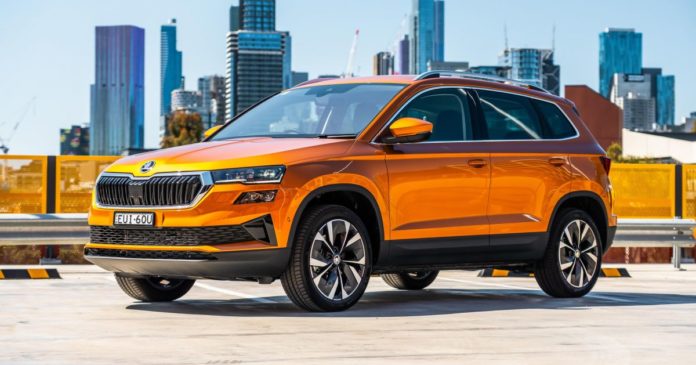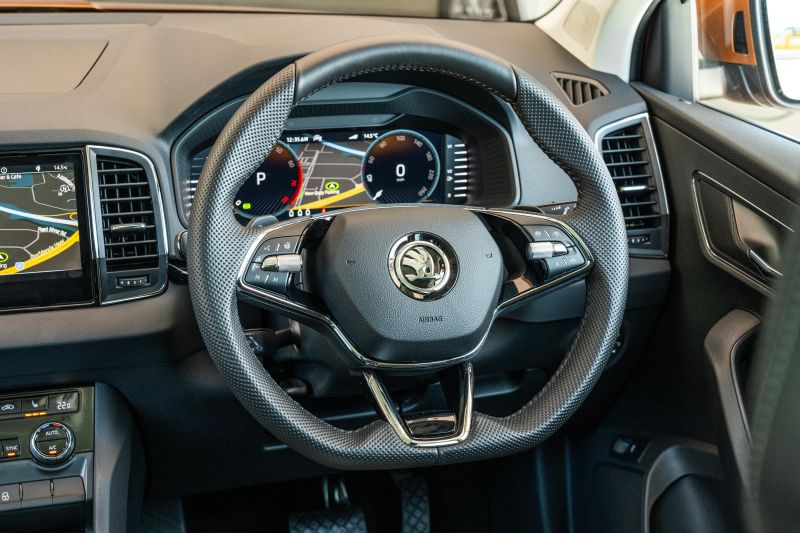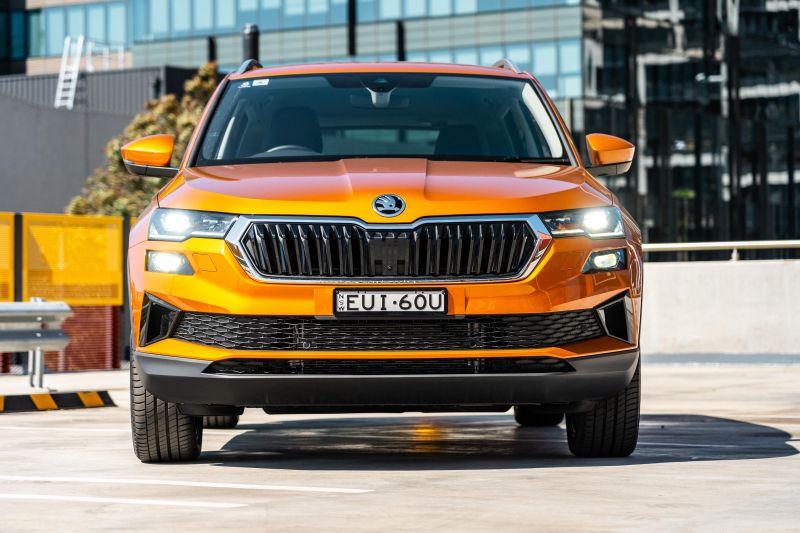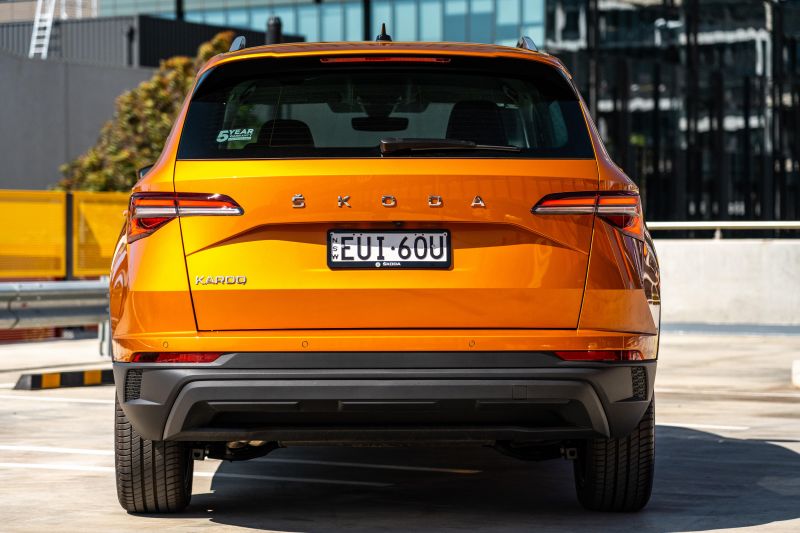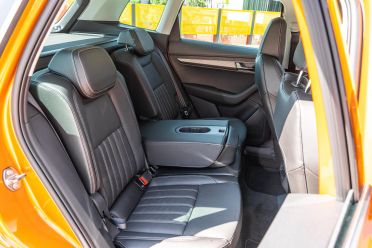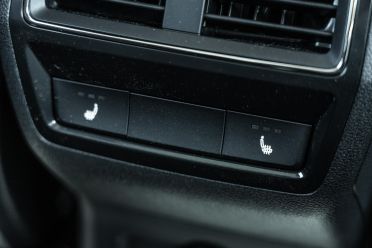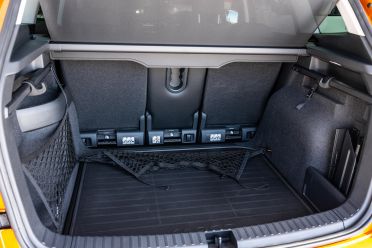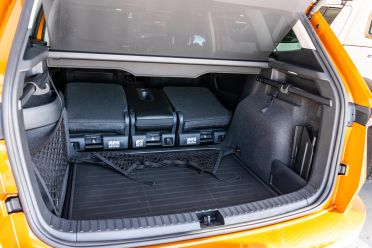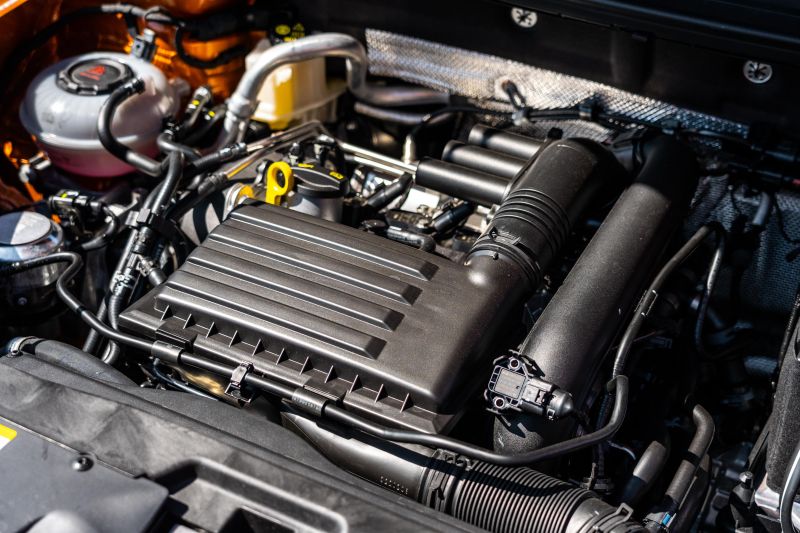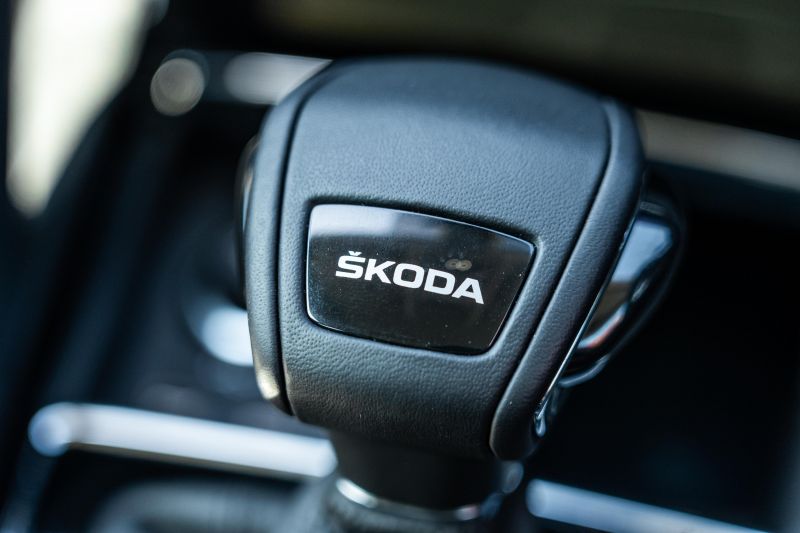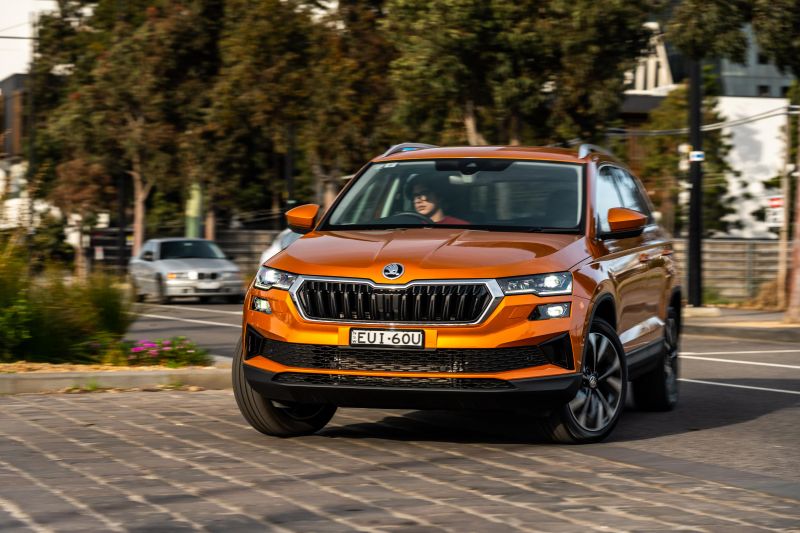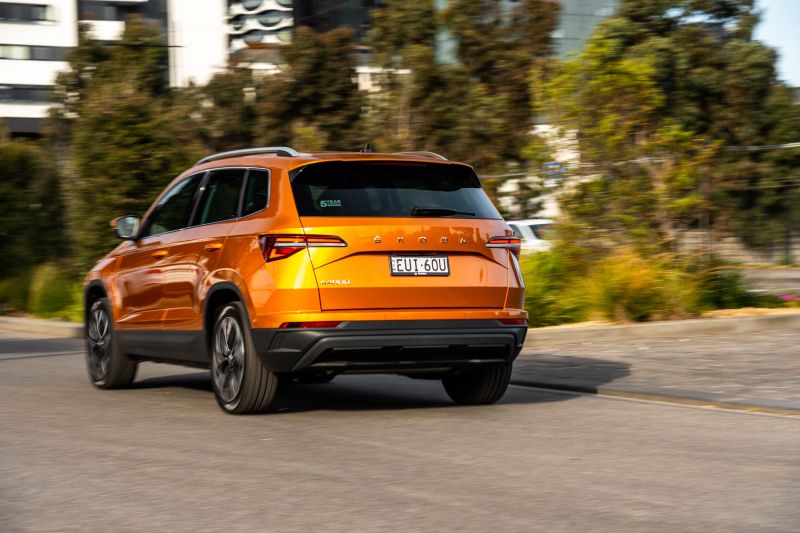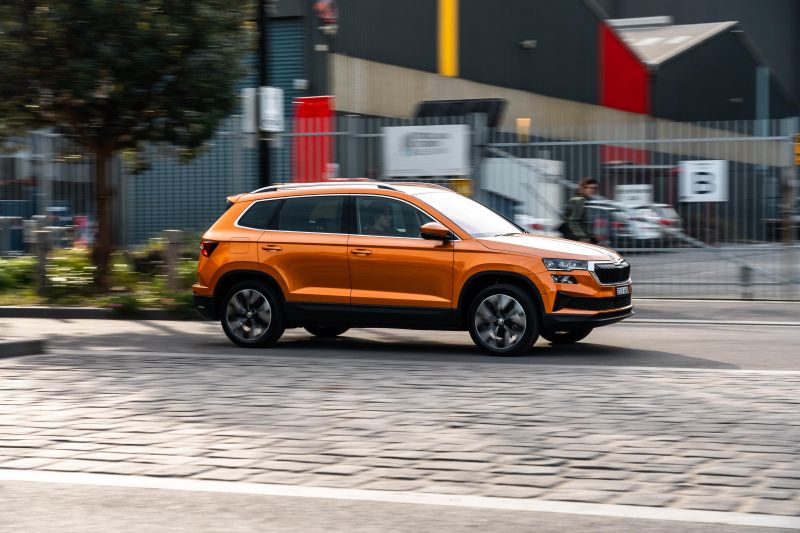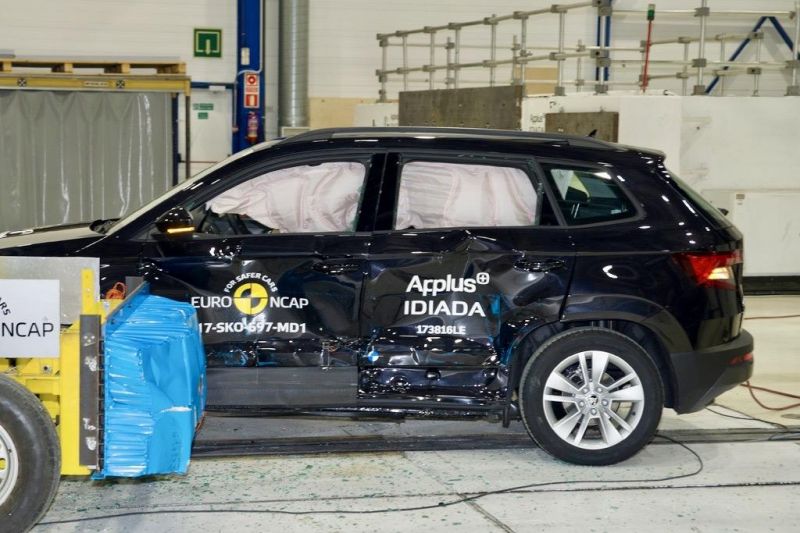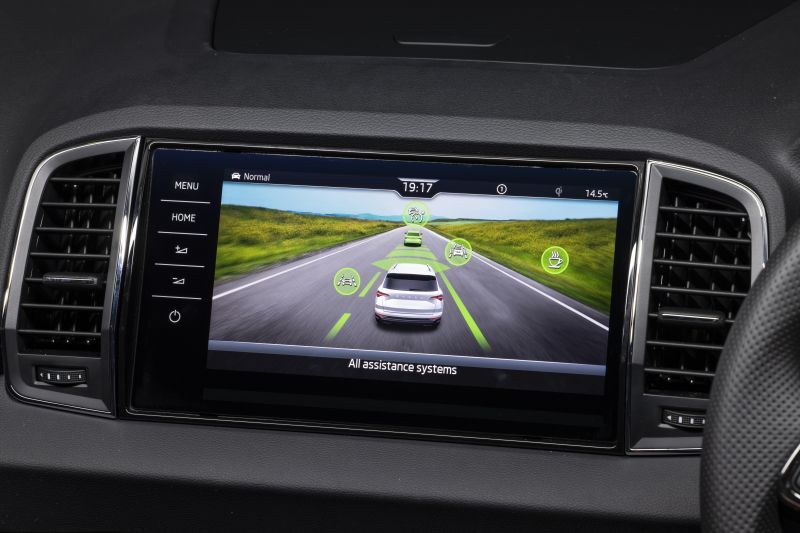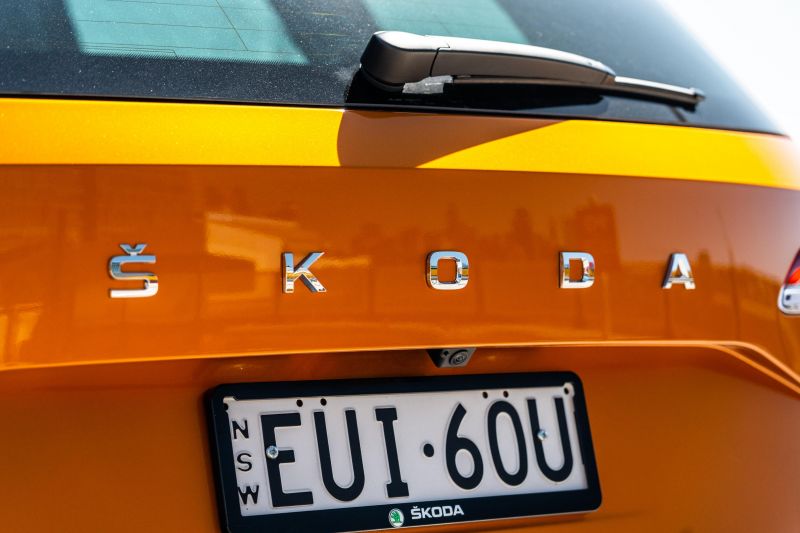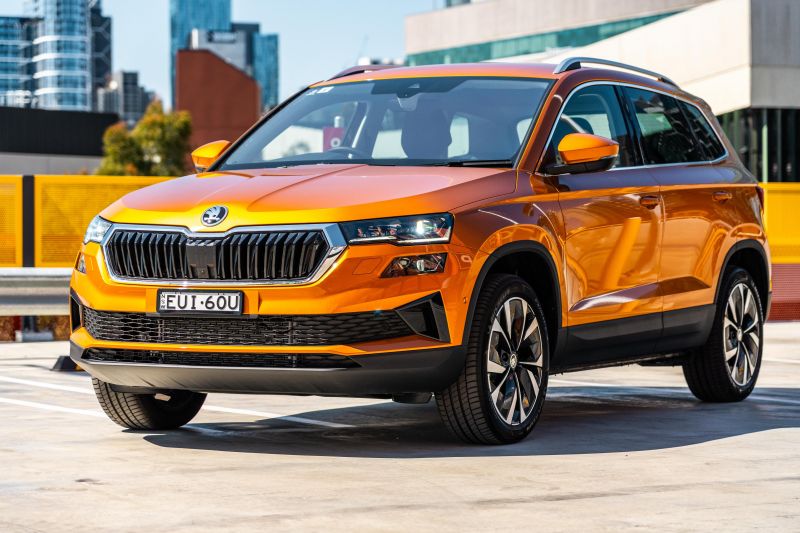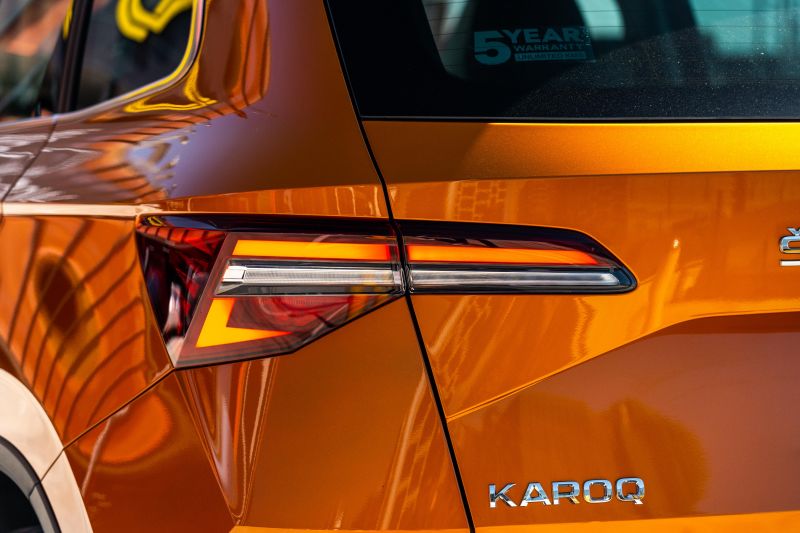The Skoda Karoq may be a niche player in Australia, but it’s a staple for the brand overseas.
After its launch in 2017, Skoda’s second SUV quickly became the second-best seller in the line-up behind the Octavia, with more than 500,000 units produced between launch and the facelifted model debuting late in 2021.
Tight supply from the homeland has hindered the Karoq’s progress in Australia, with just 979 examples finding homes locally in 2022, down on 1079 registrations the previous year.
The related Volkswagen Tiguan did about 2.5 times that volume despite similar supply challenges. Should that deter you from having a look? Absolutely not.
There’s a lot going for the compact Czech crossover, which straddles the small and medium SUV segments dimensionally much like its arch nemesis in the Nissan Qashqai.
With familiar Volkswagen underpinnings and tech, the Karoq offers a classy and no-nonsense package with a bit of flair in its bright colours – as well as a smartly-packaged interior that belies its compact dimensions.
Let’s see how the current one is holding up in 2023.
How much does the Skoda Karoq Style cost?
The entry-level Karoq in Australia is currently advertised from $43,990 drive-away.
While a price starting with a ‘4’ seems high, keep in mind Skoda does national drive-away pricing.
Our tester was fitted with all the fruit, from premium metallic paint to every option pack you can throw at it. Using the brand’s online configurator, the drive-away price of the car you see here is closer to $60,000 – which is what most of the top-sellers are charging for these days.
Having such an array of options is part of Skoda’s strategy to offer the choice to have a more basic or fully-optioned vehicle as a stand-in for more variants. Think of the $43,990 D/A model as the basic or mid-tier version, with the option packs representing a high- and then flagship-level specification.
The base price aligns with mid-range variants of the Mazda CX-5 and Toyota RAV4, and is in the same ballpark as the related Volkswagen T-Roc 110TSI Style ($39,990 D/A) which shares the same drivetrain, as well as the Nissan Qashqai ST+ which using a Victorian postcode is around $41,450 drive-away.
2023 Skoda Karoq pricing:
- Skoda Karoq Style: $43,990
- Skoda Karoq Sportline 4×4: $50,990
Prices are drive-away
What is the Skoda Karoq Style like on the inside?
The Karoq’s mid-life facelift was fairly subtle one in terms of design, but the cabin tech has been updated to bring the Skoda into line with the latest from the Volkswagen Group.
The 10.25-inch digital instrument cluster and optional 9.2-inch navigation unit in our tester have both been treated to the Group’s latest interface, dubbed MIB3.
That means new graphics, better processing, and features such as wireless Apple CarPlay and Android Auto.
With the optional display you also get embedded navigation to go with the larger screen, and it’s good the facelift brought the standard fitment of Virtual Cockpit across the board.
As we’ve found with most Volkswagen Group products, the display here is a benchmark for clarity, customisation, and breadth of features and menus. You can project maps and navigation ahead of you, as well as things like trip computer and assistance systems.
Everything works smoothly for the most part, though we experienced the occasional wireless smartphone mirroring dropout in certain parts of Melbourne – seems to be an issue with interference – though on a couple of occasions the Skoda took a while to re-establish a connection.
Also notably absent are any form of connected services, despite it being available overseas, as well as in an increasing amount of the Skoda’s competitors.
It’s perhaps not as vital in these segments as it is for EVs and the like, but the array of features the Volkswagen Group offers overseas mimics like Audi’s Connect plus range of services locally.
Storage is another Skoda strong point, with a modular centre console and a handy lidded drawer to store your phone which also features a wireless charger with signal booster.
Overall material quality is strong for the class, with a good ratio of soft-touch surfaces contrasting with textured, harder plastics. The Karoq isn’t quite as upmarket feeling as the larger Kodiaq, but it remains one of the more premium-feeling cabins in the segment – perhaps more so than the Tiguan in areas.
Despite its compact exterior, the Karoq’s second row offers pretty good space and heaps of modular aspects to tailor it to your needs.
The nifty VarioFlex seating system means you can individually recline, fold, tumble and even remove each rear seat. The back of the centre seat doubles as a fold-down centre armrest with cupholders, too.
At 6’1 I’m able to sit behind my preferred driving position in reasonable comfort, though leggier passengers may find they’re quite close to the seat backs with their knees. Two adults should be fine back there, but three across is a bit of a pinch.
Our optioned-up test car featured heated rear outboard seats, and there’s also standard rear air vents and map pockets, in addition to bottle holders in the doors.
In the Style FWD, Skoda quotes luggage capacity of 588L (VDA) with the rear seats up and up to 1810L with them folded and tumbled forward.
That’s up on the 521L-1630L quoted by the Sportline 4×4 which has AWD hardware under the boot area and also lacks the VarioFlex seating.
All versions of the Karoq are fitted with a space-saver spare wheel under the boot floor.
What’s under the bonnet?
The Karoq Style is powered by the Volkswagen Group’s 1.4 TSI four-cylinder turbo petrol engine, driving the front wheels.
Outputs are rated at 110kW (6000rpm) and 250Nm (1500-3500rpm), and like the related Octavia and Volkswagen Golf, local versions send drive to an eight-speed automatic sourced from Aisin, rather than a dual-clutch auto.
Higher up in the range you can get the Karoq Sportline 4×4 with a 2.0 TSI and all-wheel drive, featuring a seven-speed DSG. This model is more aligned with European specification, and even gets a petrol particulate filter (PPF).
Skoda quotes a 9.2-second 0-100km/h sprint for the Style 1.4 TSI. If you opt for the Sportline 4×4, that acceleration time drops to a claimed 7.0s – not far off some of the brand’s RS-badged performance models.
Overseas the Karoq is available with a wider range of powertrains, ranging from the 1.0 TSI three-cylinder petrol you find in the VW Polo to a 2.0 TDI four-cylinder diesel similar to the one found in high-spec versions of the Tiguan locally.
Currently, there are no electrified options despite an increasing amount of competitors offering some form of hybrid technology, though Skoda has confirmed the Karoq will be replaced globally in 2024 by the all-electric Elroq.
Skoda claims the Karoq 1.4 TSI uses a thrifty 6.5 litres per 100km on the combined cycle, with a 50L fuel tank. CO2 emissions are rated at 147g/km.
Even though we don’t get the newer 1.5 TSI in Australia, the entire Karoq line-up range in Australia is homologated to Euro 6 emissions standards, with 95 RON premium unleaded required as a minimum.
Skoda also quotes a 1500kg braked towing maximum for the Karoq Style, with a max downball weight of 90kg. The Sportline 4×4 ups the braked figure to 1900kg.
How does the Skoda Karoq Style drive?
If you’ve driven a 1.4 TSI-engined Golf, Tiguan or T-Roc, you’re in familiar territory here.
With its MQB underpinnings and familiar powertrain, the Karoq Style offers smooth performance and a refined overall drive perfectly suited to the daily commute.
The 1.4-litre engine is a tried-and-tested unit that offers strong low-down response and excellent fuel economy, and while the outputs aren’t standout on paper it works well with the eight-speed automatic to shift the Karoq’s 1510kg tare mass with reasonable pace – if you want more go, get the Sportline 4×4.
I miss the snappiness of a DSG. The Aisin auto feels like it’s slurring through ratios and can sometimes hunt for the right ratio, not feeling as crisp or decisive as a dual-clutch.
Give it some beans and you’ll be greeted by the typical raspy engine note and a bit more shove, but 110kW at 6000rpm isn’t a huge amount of power and it runs out of puff at the top end. It’s best to drive this in a more measured manner.
My typical commute between home and the CarExpert office takes me from the eastern suburbs via the M3 Eastern Freeway, then in and around Melbourne’s inner-city areas as I approach the Docklands. The Karoq proved more than capable of handling whatever daily life can throw at it.
The ride is typical Volkswagen taut on the Karoq Style’s passive damping and 18-inch wheels, striking a good balance between comfort and handling response if a little on the firmer side. Worth noting also, is the Karoq Style’s torsion beam rear suspension system compared to the Sportline 4×4’s more sophisticated multilink setup.
Handling is predictable and secure, in typical Skoda fashion. The steering is light but response is pretty direct, though you don’t get a huge amount of feel like you might in a Volkswagen or Cupra equivalent.
While the driving experience is overall fairly refined, you will notice a bit of tyre noise creeping into the cabin at highway speeds, particularly over rougher surfaces.
At least it’s beautifully stable and composed on the highway.
Assistance systems, many of which are optional, are typically Volkswagen Group as well. Adaptive cruise control with optional Traffic Jam Assist works a treat when navigating bumper-to-bumper congestion on peak-hour freeways, and the lane-keep assist system doesn’t feel like it’s constantly trying to wrestle the steering wheel out of your hand.
You can combine all of these functions with the Travel Assist button on the steering wheel, which allows for semi-autonomous highway driving too.
Beyond that, the (again optional) Matrix LED headlights are fantastic in poorly-lit environments, and the available Area View surround cameras makes parking a doddle. Outward visibility through the tall glasshouse is likewise very good.
What do you get?
Karoq Style highlights:
- 18-inch Miran alloy wheels, black
- LED headlights
- LED tail lights incl. dynamic indicators
- Fog lights
- Electric folding, heated side mirrors
- Rear spoiler
- Silver roof rails
- Rear privacy glass
- Electric tailgate with hands-free operation
- VarioFlex rear seats
- Keyless entry and start
- Rain-sensing wipers
- Door welcome lights with Skoda logo
- Front and rear footwell lighting
- Front and rear reading lights
- 3-spoke leather sports steering wheel
- Selectable drive modes
- Height-adjustable front seats (manual)
- 10.25-inch Virtual Cockpit digital instrument cluster
- 8.0-inch touchscreen infotainment system
- Digital radio
- 8-speaker sound system
- Wireless phone charger
- USB-C port connectivity
- Dual-zone climate control
- Luggage nets
Options
Tech Pack: $5900
- 9.2-inch Columbus infotainment system
- Satellite navigation
- Gesture control
- Matrix LED headlights
- Dynamic headlight range control
- Dynamic cornering light
- Auto parking assist
- Lane Assist
- Area View Camera
- Traffic Jam Assist
- Emergency Assist
- Ambient lighting
Premium Pack: $10,900
- Leather-appointed upholstery
- Electric front seats incl. memory, lumbar
- Heated seats front, rear
- Heated steering wheel
- 9.2-inch Columbus infotainment system
- Satellite navigation
- Gesture control
- Matrix LED headlights
- Dynamic headlight range control
- Dynamic cornering light
- Headlight washers
- Auto parking assist
- Lane Assist
- Area View Camera
- Traffic Jam Assist
- Emergency Assist
- Ambient lighting
- Auto-folding side mirrors
- Auto-dimming function
- Memory function
- Heat insulating windscreen
- Gearshift paddles
Side Assist: $1250
- Blind-spot monitoring
- Rear cross-traffic alert
Panoramic sunroof: $1900
Side steps: $1200
Colours
Standard: $NCO
Metallic / Pearlescent: $770
- Moon White Metallic
- Graphite Grey Metallic
- Brilliant Silver Metallic
- Black Magic Pearlescent
Premium Metallic: $1100
- Velvet Red Metallic
- Phoenix Orange Metallic
Is the Skoda Karoq Style safe?
The Skoda Karoq wears a five-star ANCAP safety rating based on Euro NCAP tests conducted in 2017.
All variants are covered by this rating, based on category scores of 93 per cent for adult occupant protection, 79 per cent for child occupant protection, 73 per cent for pedestrian protection, and 58 per cent for safety assist.
Standard safety equipment includes:
- 7 airbags incl. driver’s knee
- Autonomous Emergency Braking (AEB)
- Adaptive cruise control
- Driver fatigue detection
- Light Assist (auto high-beam)
- Manoeuvre Braking Assist
- Multi-collision brake
- Parking sensors front, rear
- Reversing camera
- Tyre pressure monitoring
Optional safety equipment includes:
- Auto parking assist
- Emergency Assist
- Pulls over when driver is incapacitated
- Lane Assist
- Lane departure warning
- Lane keep assist
- Matrix LED headlights
- Side Assist
- Blind-spot monitoring
- Rear cross-traffic alert
- Area View Camera (360-degree)
- Traffic Jam Assist
- Adaptive cruise control incl. stop/go
- Adaptive lane guidance
The bulk of the above optional safety and assistance equipment can be had with any of the various option packs available with the Karoq (more details below), though Side Assist is a standalone option ($1250) that wasn’t initially available for MY22 production at the launch of the facelifted model, due to component shortages at the time.
It’s a shame Skoda relegates the bulk of the safety tech suite to the options list, when most rivals – including the related Volkswagen Tiguan – fit the majority of these features as standard equipment.
How much does the Skoda Karoq Style cost to run?
All new Skodas delivered from September 1, 2022, are covered by a seven-year, unlimited-kilometre warranty.
Skoda’s warranty is longer than the five-year plans offered by its fellow Group brands Volkswagen, Audi and Cupra – giving it an added point of difference.
The seven-year term matches the likes of Kia (which was the first mover back in 2014), plus an array of challenger brands MG, GWM, and SsangYong. Skoda says customers who have purchased a car in the past five years can upgrade their existing warranty with the additional two years – for a price, which varies by model. Read more here.
As for servicing, Skoda offers five- and seven-year packages for scheduled maintenance. For the Karoq 1.4 TSI, the five-year package is $1850 while the seven-year cover is $2800. Intervals are 12 months or 15,000 kilometres.
During our week of testing, we managed to get the Karoq Style mighty close to its combined claim. We saw an indicated 6.9L/100km in mixed driving, spread fairly evenly between urban and extended highway stints.
That’s less than half a litre above the advertised figure. With a 50-litre fuel tank, you can expect a driving range of around 700km between fills.
CarExpert’s Take on the Skoda Karoq Style
Like just about every Skoda product, the Karoq deserves to do better in Australia.
It’s a worthy alternative to the likes of the Kia Seltos, Mazda CX-30, and Nissan Qashqai; bringing a distinctly European package that goes hard on interior practicality and driving refinement in a city-friendly form factor.
The Style 1.4 TSI is also impressively efficient in the real world, even if it doesn’t quite pull Toyota Hybrid numbers, and you can have it as basic or fully-specified as you like. Opt for the latter, and you get quite an upmarket suite of features and technologies in a relatively compact SUV.
It’s got a huge boot for the segment, and a fairly practical second row if not quite the segment benchmark in the latter respect.
Price and value is the ongoing question, however. Edging $60,000 as tested is probably a bit much for the FWD Karoq, which at that point is within a stone’s throw of Cupra Ateca territory – effectively the same car but with a stonking 221kW/400Nm AWD drivetrain priced from $68,990 drive-away.
-
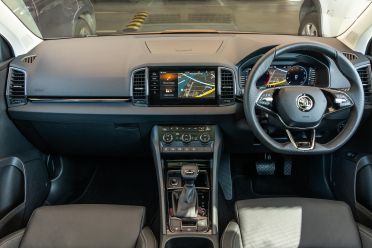
Karoq -
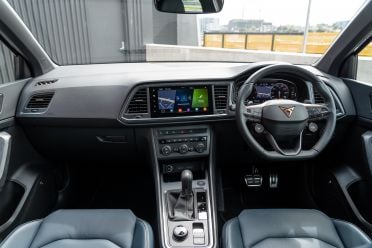
Ateca
Yes the Skoda’s cabin fitout is a little more premium than the Ateca’s, but if you fully-option the 140kW Karoq Sportline 4×4 the gap shrinks even further again.
Volkswagen is pretty much fresh out of five-seat Tiguans, meaning there’s less competition in the family, though you can get a decently specified Audi Q3 35 TFSI for similar spend to our fully-optioned tester.
Then there’s the fact that $60,000 gets you a lot of Mazda CX-5, Toyota RAV4, Hyundai Tucson or Kia Sportage. All offering more grunt, more space, and equivalent levels of specification and high-end trimmings.
But Skodas have always gone against the grain, and appeal to a specific buyer that once something different with thoughtful touches. In this respect, the Karoq nails the brief.
Click the images for the full gallery
MORE: Everything Skoda Karoq

